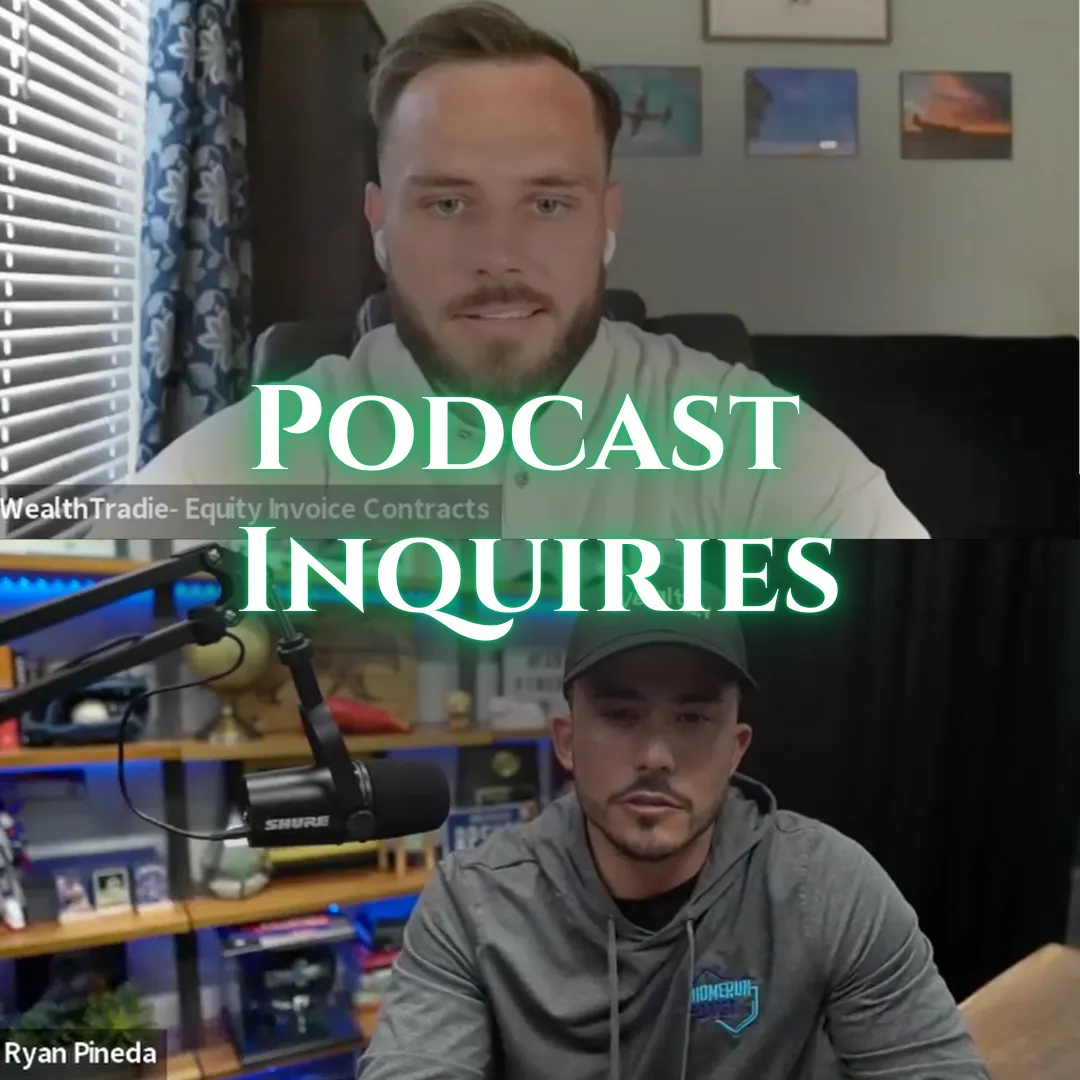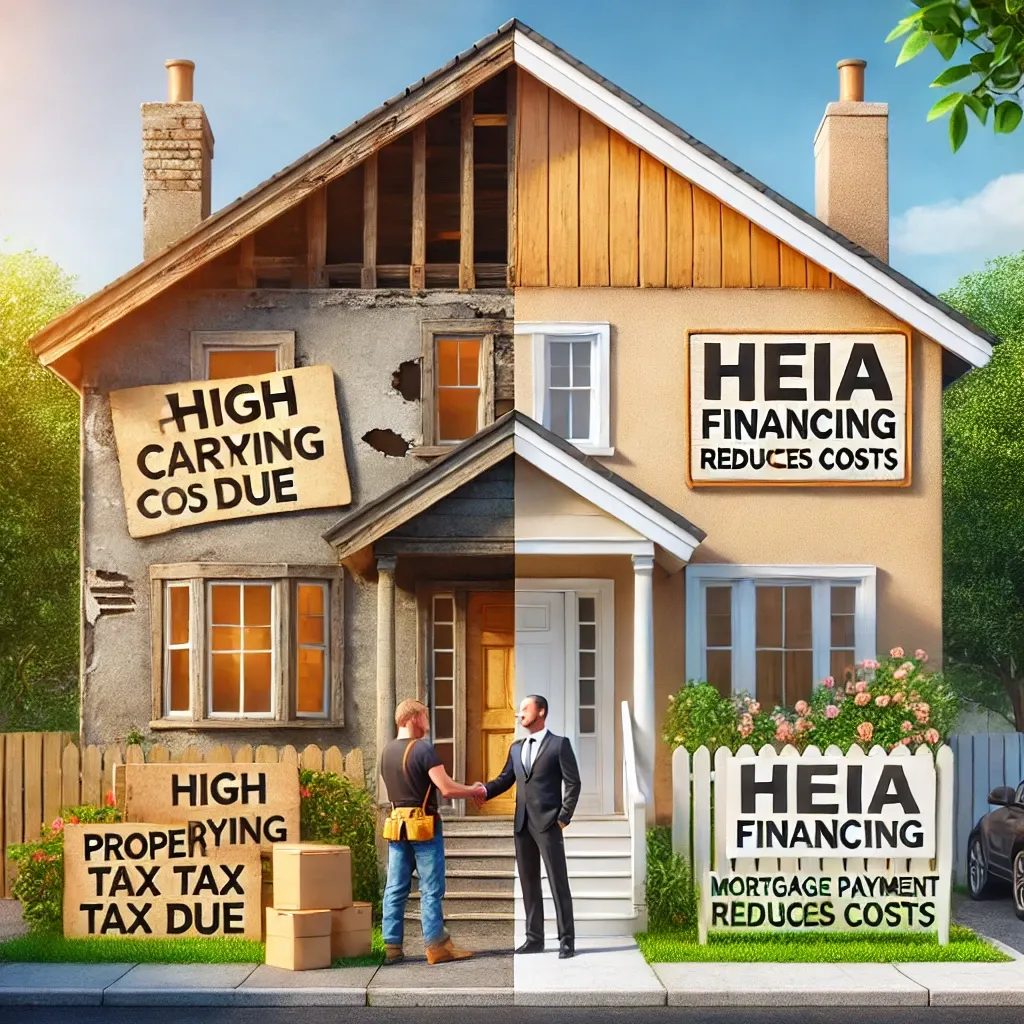Greetings
interested in learning more?
Book a call and we will happily take 15min to pass on the knowledge. We are an open book, proud to help all other real estate players build wealth
Want to hear more?
Let's Collaborate


Send a Message Instead
we'd love to hear from you

Carrying Costs in Real Estate: How HEIA Can Reduce Your Financial Burden
What Are Carrying Costs in Real Estate?
One of the biggest challenges property investors face is managing carrying costs — the ongoing expenses incurred while holding a property before it’s sold or rented. These costs can add up quickly, cutting into your profits and increasing your financial risk.
Traditionally, real estate investors cover carrying costs using cash reserves or wrapping it into high-interest loans. But there’s a smarter alternative that many investors are now turning to: Home Equity Invoice Agreements (HEIA).
In this article, we’ll break down what carrying costs are, common expenses included in carrying costs, and how HEIA can help reduce these financial burdens and improve your cash flow.
Carrying costs, also known as holding costs, refer to the ongoing expenses associated with owning a property while it’s being renovated, marketed, or waiting to be sold or rented.
These expenses include mortgage payments, property taxes, insurance, utilities, maintenance, and homeowners’ association (HOA) fees if applicable. Essentially, they are the costs you incur while holding a property before realizing any profit from a sale or rental income.
For real estate investors, carrying costs are an important factor to consider, as they can significantly impact your overall profit margins. The longer you hold onto a property, the higher your carrying costs will be.
Common Types of Carrying Costs
Several expenses fall under the category of carrying costs:
Mortgage Payments – These are your monthly loan payments for the property, whether paid monthly or at the end of the loan.
Property Taxes – Taxes owed to the local government based on the property’s assessed value.
Insurance – Homeowner’s insurance protects against damage and liability.
Utilities – Expenses for water, electricity, gas, and other essential services.
Maintenance and Repairs – Ongoing costs to keep the property in good condition.
HOA Fees – These fees apply to properties located in communities with homeowners’ associations.
Each of these costs contributes to your overall holding expenses. If a property takes longer than expected to sell or rent, your carrying costs will continue to rise, cutting into your potential profits.
How Carrying Costs Affect Your Bottom Line
Let’s consider a simple example of how carrying costs can impact your profit margins.
Imagine you purchase a property for $200,000. Your monthly carrying costs, including mortgage payments, property taxes, insurance, and utilities, amount to $2,500. If it takes you six months to sell the property, your total carrying costs will be $15,000.
That $15,000 comes straight out of your profits. If your property sits on the market longer than expected, your carrying costs could quickly spiral out of control, making your investment less profitable.
How HEIA Can Help Reduce Your Carrying Costs
This is where Home Equity Invoice Agreements (HEIA) can make a difference. Instead of covering renovation costs upfront or taking out high-interest loans, investors can use HEIA to convert contractor’s cash payments into equity agreements.
With HEIA, you don’t have to make monthly loan payments, and you can preserve your cash flow while reducing financial risk.
Here’s how HEIA helps reduce your carrying costs:
No Monthly Loan Payments – Traditional loans require monthly payments, which add to your carrying costs. With HEIA, there are no monthly payments because contractors are paid through equity shares that do not increase over time.
No Large Upfront Costs – Investors don’t need to use cash reserves to pay contractors or homeowners upfront, freeing up funds for other investments.
Aligned Incentives – Contractors have a vested interest in completing high-quality work quickly, as they’ll benefit from the property’s appreciation.
By using HEIA, you can significantly reduce the financial burden of carrying costs and keep more of your profits.
Real-Life Example: HEIA in Action
Let’s compare two investors flipping similar properties to see how HEIA can reduce carrying costs.
Investor A takes out a traditional loan to finance renovations. His monthly carrying costs, including loan payments, utilities, and property taxes, add up to $2,500. After six months, he’s spent $15,000 on carrying costs alone.
Investor B uses HEIA to cover renovation costs. He doesn’t have to make monthly loan payments, utilities, property taxes and his carrying costs are reduced to $500 per month only because the contractor requested such on a $50,000 renovation. After six months, he’s only spent $3,000 on carrying costs that is paid back.
By using HEIA, Investor B saves $15,000, and only needed $3,000 upfront. Which increases his profit margin significantly.
When to Use HEIA for Real Estate Investments
Home Equity Invoice Agreements are ideal for real estate investors who want to reduce their carrying costs and preserve their cash flow. Here are a few scenarios where using HEIA makes sense:
You want to reduce your financial burden while holding a property.
You need to preserve your cash flow for other investments.
You want to align contractor incentives with the property’s appreciation.
You’re tired of monthly loan payments cutting into your profits.
By using HEIA, investors can finance renovation projects without taking on traditional debt, ultimately reducing their carrying costs and increasing their returns.
Lower Your Carrying Costs with HEIA
Carrying costs are an unavoidable part of real estate investing, but they don’t have to be a major financial burden. By using Home Equity Invoice Agreements (HEIA), you can:
✅ Eliminate monthly loan payments.
✅ Preserve your cash flow.
✅ Align contractor incentives.
✅ Boost your profit margins.
If you’re ready to cut your carrying costs and improve your real estate investment strategy, explore how HEIA can work for you today!
WealthTradie
Homeowners
Contractors
HEIA Liaisons
NEWS
Login

Shane Walsh - Founder
Has deeply rooted experience in the construction industry, real estate investing, and creative financing. Growing up in a family construction business, serving in the Marine Corps, and successfully starting a fix-and-flip business, he discovered the power of Equity Invoice Contracts. My mission is to share this innovative approach with contractors, investors, and real estate professionals to ensure quality, accountability, and financial stability in property renovations.
(620)-837-8489.

Veteran Founded
Terms & Conditions | Privacy Policy
© 2025 WealthTradie - All rights reserved

